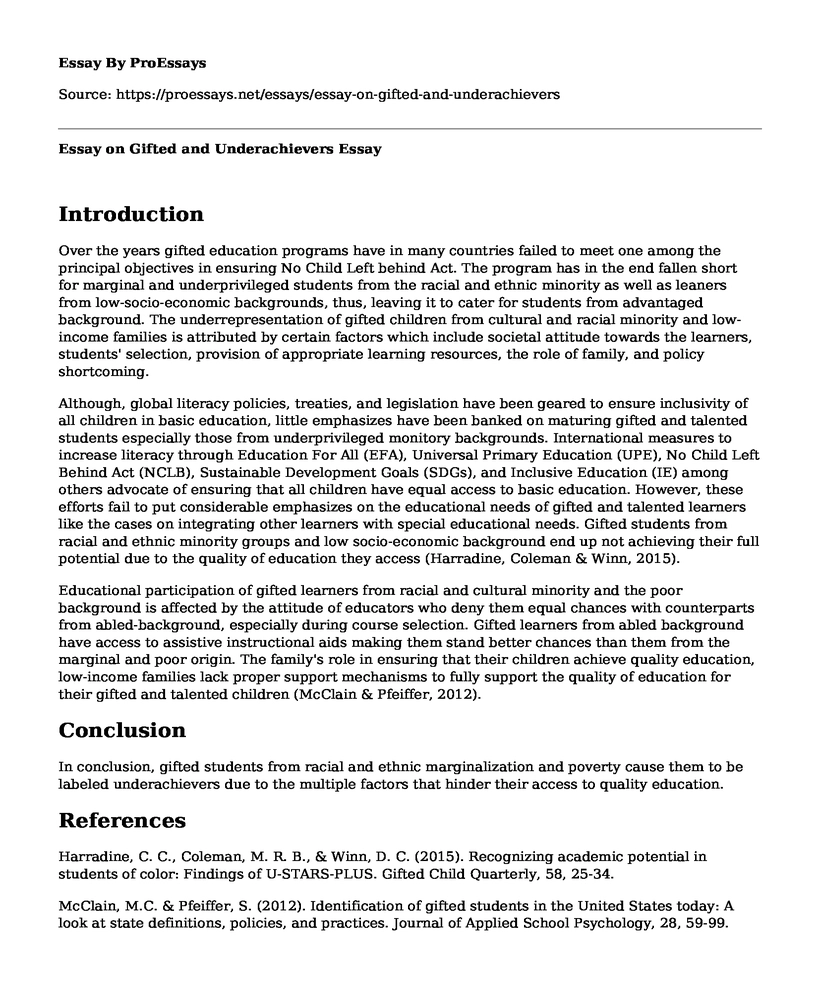Introduction
Over the years gifted education programs have in many countries failed to meet one among the principal objectives in ensuring No Child Left behind Act. The program has in the end fallen short for marginal and underprivileged students from the racial and ethnic minority as well as leaners from low-socio-economic backgrounds, thus, leaving it to cater for students from advantaged background. The underrepresentation of gifted children from cultural and racial minority and low-income families is attributed by certain factors which include societal attitude towards the learners, students' selection, provision of appropriate learning resources, the role of family, and policy shortcoming.
Although, global literacy policies, treaties, and legislation have been geared to ensure inclusivity of all children in basic education, little emphasizes have been banked on maturing gifted and talented students especially those from underprivileged monitory backgrounds. International measures to increase literacy through Education For All (EFA), Universal Primary Education (UPE), No Child Left Behind Act (NCLB), Sustainable Development Goals (SDGs), and Inclusive Education (IE) among others advocate of ensuring that all children have equal access to basic education. However, these efforts fail to put considerable emphasizes on the educational needs of gifted and talented learners like the cases on integrating other learners with special educational needs. Gifted students from racial and ethnic minority groups and low socio-economic background end up not achieving their full potential due to the quality of education they access (Harradine, Coleman & Winn, 2015).
Educational participation of gifted learners from racial and cultural minority and the poor background is affected by the attitude of educators who deny them equal chances with counterparts from abled-background, especially during course selection. Gifted learners from abled background have access to assistive instructional aids making them stand better chances than them from the marginal and poor origin. The family's role in ensuring that their children achieve quality education, low-income families lack proper support mechanisms to fully support the quality of education for their gifted and talented children (McClain & Pfeiffer, 2012).
Conclusion
In conclusion, gifted students from racial and ethnic marginalization and poverty cause them to be labeled underachievers due to the multiple factors that hinder their access to quality education.
References
Harradine, C. C., Coleman, M. R. B., & Winn, D. C. (2015). Recognizing academic potential in students of color: Findings of U-STARS-PLUS. Gifted Child Quarterly, 58, 25-34.
McClain, M.C. & Pfeiffer, S. (2012). Identification of gifted students in the United States today: A look at state definitions, policies, and practices. Journal of Applied School Psychology, 28, 59-99. doi:10.1080/15377903.2012.643757
Cite this page
Essay on Gifted and Underachievers. (2022, Jun 15). Retrieved from https://proessays.net/essays/essay-on-gifted-and-underachievers
If you are the original author of this essay and no longer wish to have it published on the ProEssays website, please click below to request its removal:
- Best Approaches for Fixing the Problem of Insecurity in American Schools
- Distinguishing Science From Pseudoscience Paper Example
- Research on Body Image & Eating Disorders Among East Strasbourg Univ. Students
- Paper Example on Social Inequality at California State University
- Essay Example on Literature Pedagogy: Transforming Teaching through Global Beliefs
- Essay on No Pay, No Support: The Reality of Unpaid Internships
- Project Management - Essay Sample







